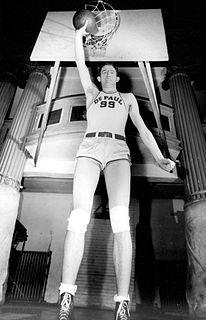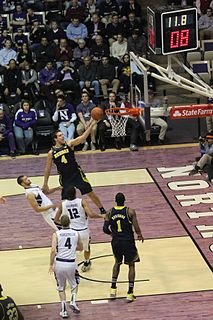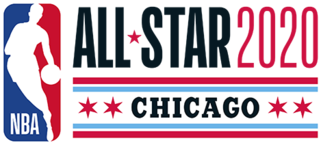Related Research Articles

Basketball is a team sport in which two teams, most commonly of five players each, opposing one another on a rectangular court, compete with the primary objective of shooting a basketball through the defender's hoop while preventing the opposing team from shooting through their own hoop. A field goal is worth two points, unless made from behind the three-point line, when it is worth three. After a foul, timed play stops and the player fouled or designated to shoot a technical foul is given one or more one-point free throws. The team with the most points at the end of the game wins, but if regulation play expires with the score tied, an additional period of play (overtime) is mandated.

George Lawrence Mikan Jr., nicknamed Mr. Basketball, was a dominant American professional basketball player for the Chicago American Gears of the National Basketball League (NBL) and the Minneapolis Lakers of the NBL, the Basketball Association of America (BAA) and the National Basketball Association (NBA). Invariably playing with thick, round spectacles, the 6 ft 10 in (2.08 m), 245 lb (111 kg) Mikan is seen as one of the pioneers of professional basketball, redefining it as a game of so-called big men with his prolific rebounding, shot blocking, and his talent to shoot over smaller defenders with his ambidextrous hook shot, the result of his namesake Mikan Drill. He also utilized the underhanded free-throw shooting technique long before Rick Barry made it his signature shot.
Overtime or extra time is an additional period of play specified under the rules of a sport to bring a game to a decision and avoid declaring the match a tie or draw where the scores are the same. In some sports, this extra period is played only if the game is required to have a clear winner, as in single-elimination tournaments where only one team or players can advance to the next round or win the tournament. In other sports, particularly those prominently played in North America where ties are generally disfavored, some form of overtime is employed for all games.

College basketball today is governed by collegiate athletic bodies including the United States's National Collegiate Athletic Association (NCAA), the National Association of Intercollegiate Athletics (NAIA), the United States Collegiate Athletic Association (USCAA), the National Junior College Athletic Association (NJCAA), and the National Christian College Athletic Association (NCCAA). Governing bodies in Canada include U Sports and the Canadian Collegiate Athletic Association (CCAA). Each of these various organizations are subdivided into from one to three divisions based on the number and level of scholarships that may be provided to the athletes.

A shot clock is used in basketball to quicken the pace of the game. The shot clock times a play and provides that a team on offense that does not promptly try to score points loses possession of the ball. It is distinct from the game clock, which times the entire game. The shot clock may be referred to by its initial value. For example, in the National Basketball Association (NBA), it may be called the "24-second clock".

In basketball, free throws or foul shots are unopposed attempts to score points by shooting from behind the free throw line, a line situated at the end of the restricted area. Free throws are generally awarded after a foul on the shooter by the opposing team. Each successful free throw is worth one point.

In basketball, a personal foul is a breach of the rules that concerns illegal personal contact with an opponent. It is the most common type of foul in basketball. A player fouls out on reaching a limit on personal fouls for the game and is disqualified from participation in the remainder of the game.

Streetball is a variation of basketball, typically played on outdoor courts and featuring significantly less formal structure and enforcement of the game's rules. As such, its format is more conducive to allowing players to publicly showcase their own individual skills. Streetball may also refer to other urban sports played on asphalt. It is particularly popular and important in New York City.

The rules of basketball are the rules and regulations that govern the play, officiating, equipment and procedures of basketball. While many of the basic rules are uniform throughout the world, variations do exist. Most leagues or governing bodies in North America, the most important of which are the National Basketball Association and NCAA, formulate their own rules. In addition, the Technical Commission of the International Basketball Federation (FIBA) determines rules for international play; most leagues outside North America use the complete FIBA ruleset.

Hack-a-Shaq is a basketball defensive strategy used in the National Basketball Association (NBA), where Dallas Mavericks coach Don Nelson adapted the strategy of committing intentional fouls to the purpose of lowering opponents' scoring. He directed players to commit personal fouls throughout the game against selected opponents who shot free throws poorly.
In sports, running out the clock is the practice of a winning team allowing the clock to expire through a series of pre-selected plays, either to preserve a lead or hasten the end of a one-sided contest. Such measures expend time, but do not otherwise have a tactical purpose. This is usually done by a team that is winning by a slim margin near the end of a game, in order to reduce the time available for the opposing team to score. Generally, it is the opposite strategy of running up the score.
In basketball, a flagrant foul is a personal foul that involves excessive or violent contact that could injure the fouled player. A flagrant foul may be unintentional or purposeful; the latter type is also called an "intentional foul" in the NBA. However, most intentional fouls are not considered flagrant and fouling intentionally is an accepted tactic to regain possession of the ball with minimal time off the game clock.

This glossary of basketball terms is a list of definitions of terms used in the game of basketball. Like any other major sport, basketball features its own extensive vocabulary of unique words and phrases used by players, coaches, sports journalists, commentators, and fans.

The Gus Macker 3-on-3 Basketball Tournament is a nationwide event for players of a variety of age and skill levels in the United States. Although every tournament is different, a typical Gus Macker event involves basketball courts set up in parking lots or closed-off public streets Tournaments are mid-level to major sports media events and are held virtually every weekend from spring through summer.
Delay of game is an action in a sports game in which a player or team deliberately stalls the game, usually with the intention of using the delay to its advantage. In some sports, the delay of game is considered an infraction if it is longer than that permitted according to the game's rules, in which case a penalty can be issued. Some sports that have a delay of game penalty are American football, Canadian football, ice hockey and association football.
description|1=Overview of and topical guide to basketball}}
In sports that use a clock, untimed play is play in which the clock does not tick. In some cases, untimed play can occur at the end of a game following the expiration of the clock, and may even be when a score occurs that decides the outcome of the game.

3x3 basketball is a form of the game played three a side on one basketball hoop. According to an ESSEC Business School study commissioned by the International Olympic Committee, 3x3 is the largest urban team sport in the world. This basketball game format is currently being promoted and structured by FIBA, the sport's governing body. Its primary competition is an annual FIBA 3X3 World Tour, comprising a series of Masters and one Final tournament, and awarding six-figure prize money in US dollars. The FIBA 3x3 World Cups for men and women are the highest tournaments for national 3x3 teams.

The Basketball Tournament (TBT) is an open-application, single-elimination tournament played each summer in the United States, currently featuring 64 teams and offering $2 million in winner-take-all prize money, broadcast by ESPN. TBT was founded in 2014 by Jonathan Mugar.

The 2020 NBA All-Star Game was an exhibition game played on February 16, 2020. It was the 69th edition of the event. The game was held at the United Center in Chicago, Illinois, home of the Chicago Bulls. This was the third time that Chicago hosted the All-Star Game. The other two times, in 1973 and 1988, the game was played at Chicago Stadium, the Bulls' previous home arena. The game was televised nationally by TNT for the 18th consecutive year.
References
- 1 2 Greene, Nick (February 18, 2020). "An Interview With the Man Who Helped Make the NBA All-Star Game Exciting". Slate Magazine.
- ↑ "Nick Elam". Ball State University.
- ↑ "The Impact of the Ohio Teacher Evaluation System on Principals' Approaches and Perceptions Toward Evaluation". OhioLink.
- ↑ Mike Jensen (August 1, 2019). "The Elam Method explained, by Elam himself and the basketball players using it". Philadelphia Inquirer.
- ↑ Wasserman, Howard M. (November 30, 2018). "Infield Fly Rule Is in Effect: The History and Strategy of Baseball's Most (In)Famous Rule". McFarland – via Google Books.
- ↑ "How the Elam Ending came to the NBA All-Star Game, with some help from Chris Paul". Oklahoman.com. February 16, 2020.
- 1 2 Tim Hackett (April 26, 2018). "The Elam Ending: One Man's Plan to Eliminate Intentional Fouling". Sports Illustrated.
- ↑ Lowe, Zach (June 18, 2018). "New kind of crunch time has NBA luminaries excited". ESPN.